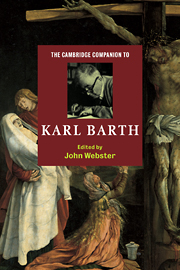Book contents
- Frontmatter
- 1 Introducing Barth
- 2 Theology
- 3 Revelation
- 4 The Bible
- 5 The Trinity
- 6 Grace and being
- 7 Creation and providence
- 8 Karl Barth’s Christology
- 9 Salvation
- 10 The humanity of the human person in Karl Barth’s anthropology
- 11 The mediator of communion
- 12 Christian community, baptism, and Lord’s Supper
- 13 Barth’s trinitarian ethic
- 14 Karl Barth and politics
- 15 Religion and the religions
- 16 Barth and feminism
- 17 Barth, modernity, and postmodernity
- 18 Karl Barth
- Index
12 - Christian community, baptism, and Lord’s Supper
Published online by Cambridge University Press: 28 May 2006
- Frontmatter
- 1 Introducing Barth
- 2 Theology
- 3 Revelation
- 4 The Bible
- 5 The Trinity
- 6 Grace and being
- 7 Creation and providence
- 8 Karl Barth’s Christology
- 9 Salvation
- 10 The humanity of the human person in Karl Barth’s anthropology
- 11 The mediator of communion
- 12 Christian community, baptism, and Lord’s Supper
- 13 Barth’s trinitarian ethic
- 14 Karl Barth and politics
- 15 Religion and the religions
- 16 Barth and feminism
- 17 Barth, modernity, and postmodernity
- 18 Karl Barth
- Index
Summary
FOR AND AGAINST CHURCH AND SACRAMENT
Barth has a curious ambivalence towards the topic of this chapter. On the one hand, he called his great work Church Dogmatics (emphasis added). Each of its volumes (not to mention Barth's many other essays and books) speak within and about the church - or, as Barth came to put it, the body of Christ and thus provisional representative of all the world. In this sense, Barth was a key participant in a peculiarly modern debate over church and the rise of 'ecclesiology'. On the other hand, Barth was always a sharp critic of the church, whether in his early commentaries on Paul's letter to the Romans, his many essays on the German 'Church struggle' in the 1930s, or his smiles over triumphalistic claims that the nineteenth and twentieth centuries are 'the century of the Church'. Indeed, he preferred to speak of 'the Christian community' rather than 'the Church'.What are we to make of this ambivalence? Barth's theology from the midst of this Christian community could all but guarantee that he would be marginal to those sections of the modern world for which the church is decreasingly a foothold for personal and professional fame and fortune. Yet his deep criticisms of the church could seemingly guarantee that Barth would also be marginal to the very community from which and to which he spoke. Barth forces us to ask how, if at all, we can speak with one voice for and about as well as against the church.
- Type
- Chapter
- Information
- The Cambridge Companion to Karl Barth , pp. 195 - 211Publisher: Cambridge University PressPrint publication year: 2000
- 2
- Cited by



